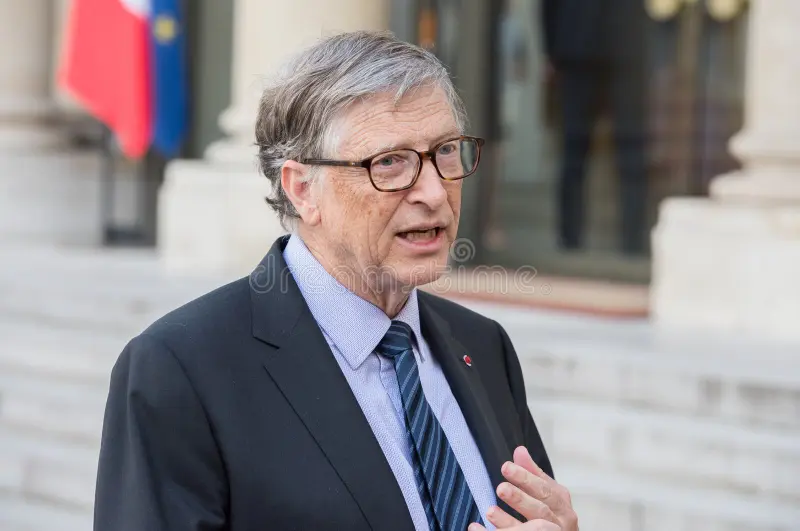Bill Gates: Tech Visionary, Billionaire, and Global Philanthropist
Bill Gates: A Visionary Entrepreneur and Philanthropist

You May Like : Elon Musk Net Worth
Early Life and Education of Bill Gates
Bill Gates, co-founder of Microsoft, was born on October 28, 1955, in Seattle, Washington. Raised in a highly educated family, he developed an interest in computers at a young age. His passion for programming led him to create his first software program while studying at Lakeside School. Recognizing his potential, his parents supported his ambition, allowing him to explore computing further.
After excelling in high school, Gates enrolled at Harvard University in 1973. However, he left before completing his degree to pursue his dream of developing software, a decision that would change the technological landscape forever.
The Birth of Microsoft
In 1975, Gates, alongside his childhood friend Paul Allen, founded Microsoft. Their first breakthrough came with the development of a BASIC interpreter for the Altair 8800, an early personal computer. This success paved the way for the growth of Microsoft as a major player in the software industry.
The Rise of Microsoft and Windows
The Bill Gates legacy in technology took shape in 1980 when Microsoft secured a deal with IBM to provide an operating system for its first personal computer. Microsoft purchased a system called QDOS, modified it, and introduced MS-DOS. This operating system became the foundation for future innovations.
In 1985, Microsoft launched Windows, revolutionizing personal computing by introducing a graphical user interface. Over the years, Windows evolved, becoming the dominant operating system worldwide. By the 1990s, Microsoft had cemented its position as a tech giant, with products like Microsoft Office, Internet Explorer, and Windows NT further expanding its influence.
Bill Gates’ Leadership and Microsoft’s Expansion
Under Gates’ leadership, Microsoft grew exponentially, securing a monopoly in the PC software market. The introduction of Windows 95 in 1995 marked a major milestone, significantly enhancing user experience and integration. Despite facing legal battles over antitrust concerns, Microsoft maintained its dominance, adapting to market changes and technological advancements.
Transition from Microsoft to Philanthropy
In 2000, Gates stepped down as Microsoft’s CEO, shifting his focus toward philanthropy. He founded the Bill & Melinda Gates Foundation, a nonprofit organization dedicated to addressing global challenges such as poverty, healthcare, and education. This transition signified a new chapter in his life, emphasizing social impact over corporate success.
Bill Gates’ Contributions to Global Health
Through the Bill Gates legacy in technology and philanthropy, his foundation has played a crucial role in eradicating diseases like polio and malaria. With billions of dollars invested in vaccine development, sanitation, and healthcare infrastructure, Gates has been instrumental in improving global health conditions. The foundation collaborates with governments and organizations worldwide to address pressing health concerns.
Innovations and Investments in Technology
Although Gates stepped away from Microsoft’s daily operations, he remained active in the tech industry. He has invested in several cutting-edge projects, including artificial intelligence, renewable energy, and biotechnology. His contributions to clean energy, through ventures like TerraPower, highlight his commitment to a sustainable future.
The Role of Bill Gates in Pandemic Response
During the COVID-19 pandemic, Gates emerged as a key advocate for vaccine research and distribution. His foundation allocated significant funding to accelerate vaccine development, ensuring equitable access for developing countries. Despite facing conspiracy theories and criticism, Gates continued to emphasize the importance of scientific innovation and global cooperation in combating pandemics.
Bill Gates’ Personal Life and Influence
Beyond his professional achievements, Gates has maintained a strong presence in public discourse. His marriage to Melinda French Gates lasted 27 years before their divorce in 2021. Despite personal changes, they continue to co-manage their foundation, focusing on impactful philanthropy.
Gates is also an author, sharing insights on technology, climate change, and innovation. His books, such as How to Avoid a Climate Disaster, reflect his commitment to global progress.
Bill Gates’ Net Worth
As one of the richest individuals in the world, Bill Gates has amassed an enormous fortune through his technological ventures and investments. As of 2024, his net worth is estimated to be around $114 billion. While much of his wealth comes from Microsoft, he has diversified his investments into multiple industries, including healthcare, energy, and real estate. Despite his vast fortune, Gates has pledged to donate a significant portion of his wealth through initiatives like the Giving Pledge, which he co-founded with Warren Buffett.
Challenges and Controversies
Like many influential figures, Gates has faced challenges and controversies. Microsoft’s legal battles over monopolistic practices in the late 1990s raised concerns about corporate ethics. Additionally, his immense wealth and involvement in global health initiatives have sparked debates on billionaire philanthropy’s role in policymaking.
Despite these criticisms, Gates continues to advocate for technological advancement and humanitarian causes. His willingness to address issues directly has solidified his reputation as a thought leader.
Bill Gates’ Legacy and Future Endeavors
The Bill Gates legacy in technology and philanthropy remains unparalleled. His contributions to computing revolutionized the world, while his philanthropic efforts have transformed lives globally. As he continues to invest in sustainability, healthcare, and education, his impact on future generations remains undeniable.
Conclusion: The Everlasting Influence of Bill Gates
Bill Gates’ journey from a tech entrepreneur to a global philanthropist exemplifies the power of innovation and social responsibility. His efforts in technology, health, and sustainability continue to shape the world in profound ways.
Weird to the wonderful – if you wanna know, we’ve got it covered!